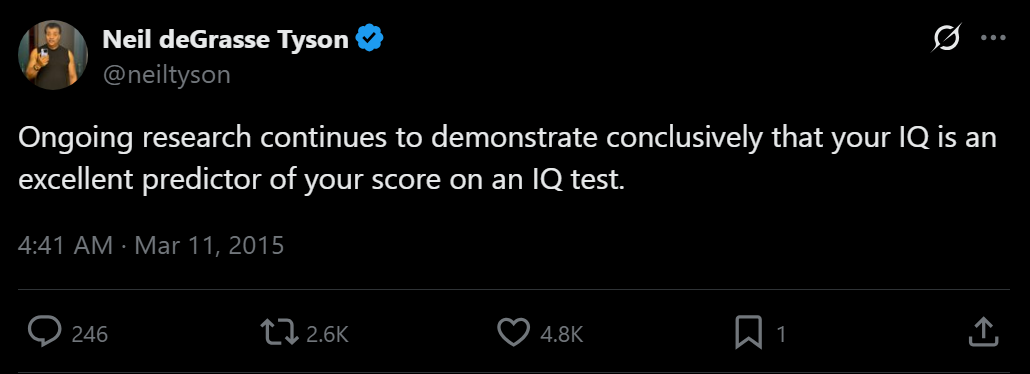Neil deGrasse Tyson IQ – How Intelligent Is the World’s Favorite Astrophysicist?
What's Neil deGrasse Tyson's IQ? The famous astrophysicist has never disclosed his score and actively dismisses IQ testing as meaningless. But let us speculate and explore his journey from grad school failure to becoming America's top science communicator.


Back
4 mins read
Neil deGrasse Tyson is probably the most recognizable scientist in America right now. He hosted the reboot of Cosmos, runs the Hayden Planetarium, and has 14.7 million Twitter followers. People naturally want to know how smart he is.
So what's Neil deGrasse Tyson's IQ?
Neil deGrasse Tyson has never publicly disclosed his IQ, and no credible documentation exists. Based on his educational achievements (Harvard physics degree, Columbia astrophysics Ph.D.) and career trajectory, estimates would likely place him somewhere in the 130-150 range. But the number you see online — 123, has no verified source. More tellingly, Tyson himself thinks IQ tests are basically useless.
In 2015, he tweeted: "Ongoing research continues to demonstrate conclusively that your IQ is an excellent predictor of your score on an IQ test."

That's not a compliment. That's Tyson sarcastically pointing out that IQ tests measure themselves, nothing more.
What Tyson Actually Says About IQ
The widely circulated 123 figure appears on low-credibility websites, but even those sites admit it "lacks any official source or scientific basis." Nobody can trace where this number came from.
Tyson addressed IQ directly in his 2019 book "Letters from an Astrophysicist." Someone asked him about IQ and success, and he basically said it doesn't matter. He acknowledged that IQ predicts academic performance decently well, but once you get your first job, nobody cares.
What matters instead for success? "Your people skills, leadership skills, real-world problem-solving skills, integrity, business acumen, work ethic, kindness, compassion." This quote from his book is a bright example of how high emotional intelligence and social skills can be more detrimental to success, rather than IQ only.
He's also been quoted as saying, "No one worth their salt in astrophysics knows or cares what my IQ is" in secondary sources, though these lack direct verification.
What His Education Actually Shows

Early obsession, rapid progression
His first visit to the Hayden Planetarium at age 9 changed everything. By 12, his father bought him a telescope. At 15, he was giving astronomy lectures. At 17, he graduated from Bronx High School of Science, where he wrestled, edited the Physical Science Journal, and took after-school astronomy classes.
When Carl Sagan personally recruited him to Cornell, Tyson picked Harvard instead. At Harvard (1976-1980), he got his physics degree at 21 while also rowing crew, wrestling varsity, and doing jazz, ballet, and Latin ballroom dancing.
Graduate school got messy
At the University of Texas at Austin, Tyson earned his Master's in Astronomy in 1983. But his doctoral work there fell apart. His dissertation committee was dissolved. His advisor, Craig Wheeler, later said, "Research was not his strength. He was never going to solve any major scientific problems. But I knew he was going to do something big, because he had charisma."
Tyson got kicked out. He's been open about it: "I don't hold a grudge, and I don't blame the department for kicking me out. I might have done the same thing in their position."
During this period, he won a gold medal at the 1985 national ballroom dancing tournament.
Columbia comeback
After a year of teaching at Maryland, Tyson got into Columbia. He earned his Ph.D. in Astrophysics in 1991 at age 32. His dissertation studied the galactic bulge and involved two years of observational work in Chile. At graduation, he noted: "As of this afternoon, my Ph.D. will bring the national total of Black Astrophysicists from 6 to 7 (out of 4,000 nationwide)."
His Research Is Solid But Not Groundbreaking
Tyson published 13 peer-reviewed papers as primary or co-primary author between 1985 and 1998. His research made solid contributions to galactic astronomy, particularly around galactic bulge chemical evolution. ResearchGate shows 1,506 total citations across 69 publications — respectable but not exceptional.
His research essentially stopped after 1996 when he became director of the Hayden Planetarium. This was a deliberate choice. Tyson shifted from being a researcher to being a science communicator and institutional leader.
Where He Actually Made His Mark

Transforming the Hayden Planetarium
In 1996, at age 38, Tyson became director of the Hayden Planetarium. He immediately undertook a $210 million reconstruction (1997-2000), completed on time and on budget. In 2000, he reclassified Pluto as a dwarf planet — six years before the International Astronomical Union made it official. The decision sparked national controversy but was scientifically correct.
Becoming Carl Sagan's successor
When Sagan died in 1996, Tyson delivered a eulogy at his memorial service. In 2014, he hosted the Cosmos reboot, reaching an estimated 500+ million viewers in 181 countries. His social media reach is massive: 14.7 million Twitter followers, 5.7 million TikTok followers, 5.4 million Facebook followers. His book "Astrophysics for People in a Hurry" became an international bestseller.
Awards for communication, not research
Tyson has 27 honorary doctorates. NASA gave him their Distinguished Public Service Medal twice. The National Academy of Sciences awarded him the Public Welfare Medal in 2015 — their highest award "for bringing science to the nation." Notice the pattern: these awards recognize his ability to communicate science, not his research discoveries.
Why The IQ Number Doesn't Matter
Tyson's career trajectory makes a better argument against IQ obsession than any philosophical debate could. He got kicked out of grad school at UT Austin because "research was not his strength." His advisor flat-out said he'd never solve major scientific problems.
Then he became the most influential science communicator in America. He raised $210 million for the Hayden Planetarium. He reached hundreds of millions through Cosmos. He built a platform with over 28 million combined social media followers.
None of that happened because of a test score. It happened through strategic thinking about where his actual strengths lay, willingness to pivot after failure, and understanding that scientific impact isn't just about research papers.
What This Means
Neil deGrasse Tyson likely has an IQ somewhere in the 130-150 range based on his academic credentials, but he's never disclosed a score and actively dismisses IQ testing as meaningful. His career validates that skepticism. He succeeded through communication skills, strategic choices, and resilience after failure, not through test scores. His refusal to play the IQ game isn't evasion. It's a statement about what actually matters in scientific contribution.


Return to Blog




